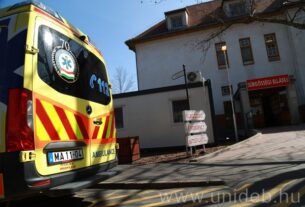Among the participants, the largest contingents are from China, Poland, and the United States of America. The chronologically most advanced student this summer is 79 years of age, while the youngest one is 10, for which reason he is accompanied by his parents at the course.
“It is a great pleasure for us that our institution can again host a DSS course because, thus, it can be an organic part of the efforts of popularizing the Hungarian language, culture, and history, as well as perhaps the Hungarian way of thinking, as a consequence of which the participating students may later promote the University of Debrecen, too, in the big wide world,” said Vice-Rector for Academic Affairs László Csernoch in his address delivered at the opening ceremony.
“For a number of decades, Debrecen Summer School has represented a mission in cultural diplomacy, which has always been supported by the municipal government, since it is important for those who live here what kind of an image develops in the world about Hungary, the Hungarians, and the citizens of Debrecen. And these serious value generating activities need to be approved and encouraged by all means, as there is no mission more important for us than this,” said Szabolcs Komolay, Vice-Mayor of the city of Debrecen for Cultural Affairs.
It is not only the total number of participants but also the number of scholarship grant recipients that has increased this year: there are almost 100 students here now on various kinds of scholarship. Sixty-three of them have been awarded grants by Tempus Közalapítvány [Tempus Public Foundation], six are sponsored by the city of Debrecen, four receive support from the Student Self-Government of the University, while the attendance of the rest of them is subsidized by Hungarian and foreign business partners of DSS.
A new feature in this respect is the scholarship grant offered by Debreceni Egyetem Bölcsészettudományi Kara[Faculty of Humanities at the University of Debrecen], which can be awarded to a university instructor or researcher who has been in touch with Hungarian language and culture for some time in one form or another. The establishment of Bölcsészettudományi Kar Dékáni Ösztöndíja [Dean of Humanities Scholarship Grant] has been announced by Deputy Dean Péter Csatár. The first person to receive this support from the Faculty of Humanities is going to be a PhD student from Turkey, coming for the second two weeks of the summer course.
“It is not purely by chance that the largest group of students is from China. The University of Debrecen has been in active cooperation with as many as four institutions of higher education in China, including BISU (Beijing International Studies University) and TFSU (Tianjin Foreign Studies University), where Hungarian programs have already been offered, while at X’ian University and CUC (Communications University of China), Beijing, courses in Hungarian are planned to start this September. Thanks to these connections, there will be 39 Chinese students coming to Debrecen in September 2018 for a study-abroad year,” said Péter Szaffkó. The director of Debrecen Summer School added that there would also be some first-timers at DSS this year from distant and “exotic” countries, such Angola, Peru, and Saudi Arabia.
Tradition and innovation will be both present at this year’s summer course, for the organizers have decided to introduce a couple of new extra-curricular activities in addition to the ever-popular ones that are regularly available. Therefore, there will be an excursion to Hortobágy, just like in previous years, but there will also be new locations offered for day trips, with destinations such as Sörárium and Reptárium in the city of Szolnok. Tuesday nights will continue to be folklore nights, where the participants can get to learn about and try the special dishes, songs, and dances of specific regions in and around the Carpathian Basin.
Press Office, unideb.hu










